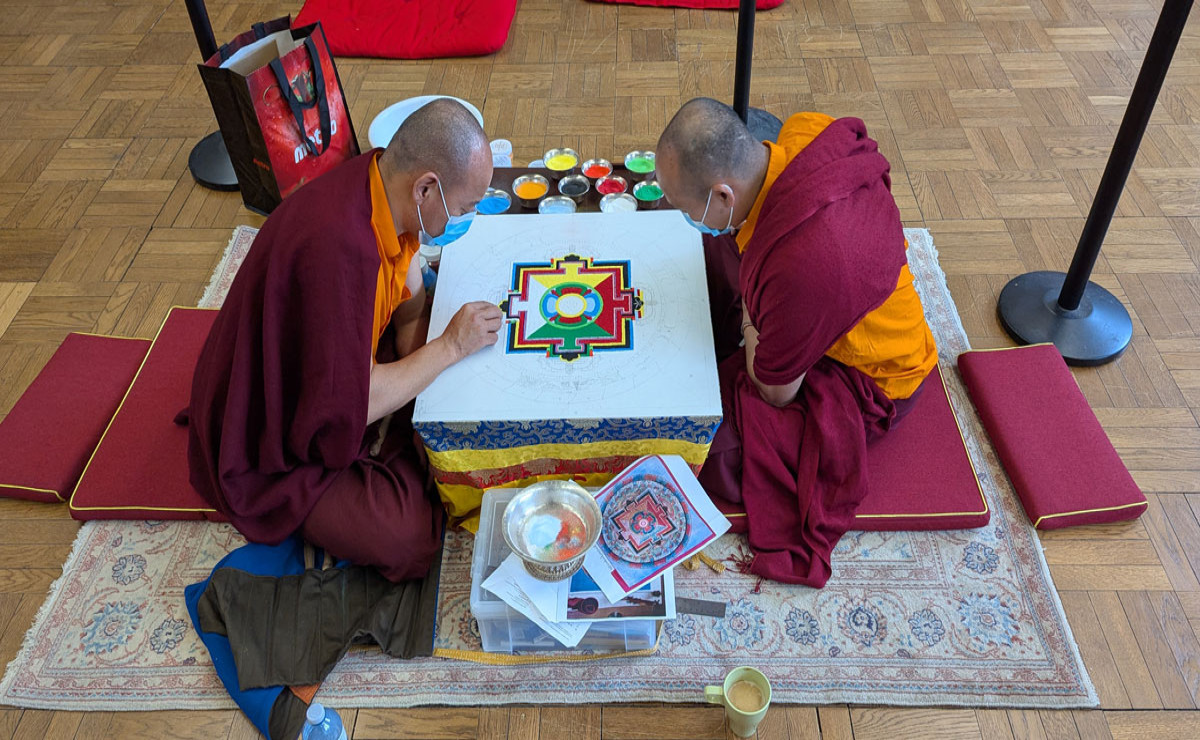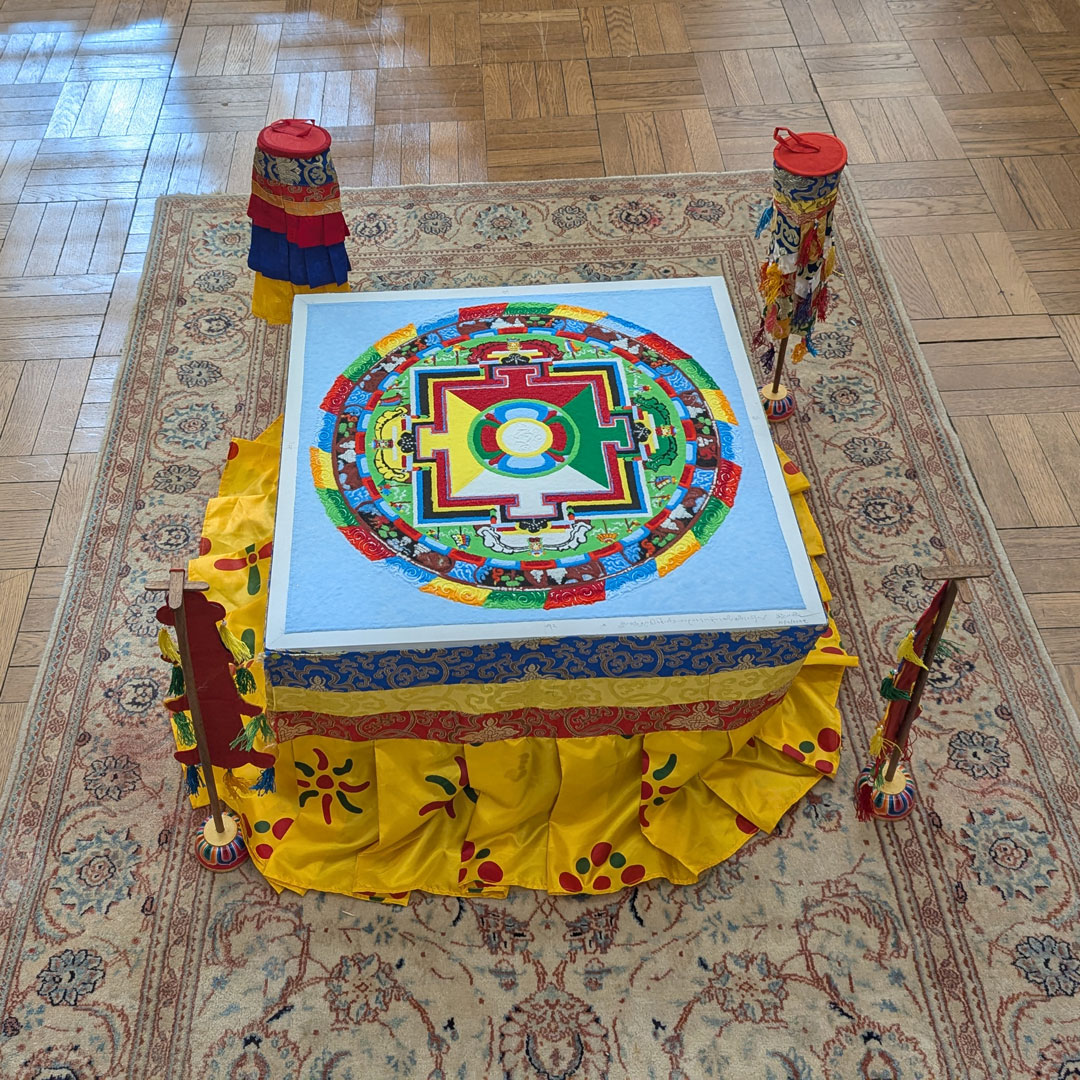Emmanuel College Hosts Landmark Buddhist Care Educators’ Event

Tibetan monks from the Palyul Pema Mani Center create a sand mandala at Emmanuel College, marking 10 years of the Buddhist focus in the MPS program.
Emmanuel College played host to the annual meeting of the Buddhist Spiritual Care Educators in North America on March 22-23, the first time the international consortium that discusses the training of Buddhist monks and chaplains has met in Canada.
The annual meeting was part of the celebration of the 10th anniversary of the Buddhist focus within Emmanuel’s Master of Psychospiritual Studies program.
The BSCENA was formed as the Buddhist Ministry Working Group at a conference at Harvard University in 2015 to identify and address concerns within the field of Buddhist chaplaincy and was renamed last year.
The main purpose of the group has been to create and support the fields of Buddhist spiritual care, leadership and service. Given the relatively recent development of Buddhist ministry or chaplaincy in the West, discussions have focused on how different types of Buddhist training fit with accreditation standards in North America.
About 25 members of the consortium attended the event. Founding members of the consortium include: Harvard Divinity School, the Institute of Buddhist Studies at the University of California, Berkely, Maitripa College in Portland, Ore., Naropa University in Boulder, Colo., the New York Zen Center for Contemplative Care, Union Theological Seminary in New York City, the University of Chicago Divinity School, University of the West (a private Buddhist University in Rosemead, Calif.), the Upaya Zen Center Buddhist Chaplaincy Training Program, the Won Institute of Graduate Studies in Warminster, Penn., Won Institute, and Emmanuel College.
Leading up to this event, Emmanuel College hosted a two-day conference, “Transforming Words into Wisdom: Interreligious Perspectives on Moral Injury Through a Buddhist Lens.” The goal of the conference was to foster dialogue among scholars, practitioners and students, deepening the collective understanding of moral injury. The conference also highlighted Emmanuel College’s commitment to interreligious engagement by including faculty and students from Christian, Muslim and Buddhist backgrounds to participate in the discussions, reflecting the diversity of thought and practice that defines Victoria University’s academic community.
Professor Henry Shiu, director of The Centre for Religion and its Contexts at Emmanuel College, said the conference and the BSCENA meeting solidified Emmanuel’s reputation and friendship with the group.
“They knew about Emmanuel’s inter-religious program, but this was the first time they experienced this multifaith ethos here,” said Shiu, the Shi Wu De Assistant Professor in Chinese Buddhist Studies.
“They were amazed during the conference when our faculty and staff from all three streams of the Master of Psychospiritual Studies program all participated and shared insights from the perspective of their religious traditions. We all learn from each other and that is something that is really unique about Emmanuel College.”
Also as part of the 10th-anniversary celebration of the Buddhist focus within the MPS program, a group of Tibetan monks from the Palyul Pema Mani Center in North York, led by its resident teacher Tulkudawa Gyalpo Rinpoche, conducted a three-day ritual to create and dismantle a sand mandala. A mandala is an art form where monks use coloured sand to create intricate geometic patterns representing the universe and the path to enlightenment. The mandala is then destroyed to symbolize impermanence.

The completed sand mandala crafted by Tibetan monks at Emmanuel College.
This mandala was dedicated to Avalokiteśvara, the Bodhisattva of Great Compassion. A bodhisattva is a Buddhist deity who has attained the highest level of enlightenment but who delays their entry into paradise to help others.
“Avalokiteśvara embodies the principles of compassion, making this ritual a perfect reflection of the MPS program’s values,” said Tulkudawa Gyalpo Rinpoche. “The Tibetan mandalas are created as spiritual symbols representing the core philosophies of Tibetan Buddhism, such as wisdom, compassion and impermanence. They serve not only as visual metaphors for the universe but also as tools for purification, blessing and healing.”
